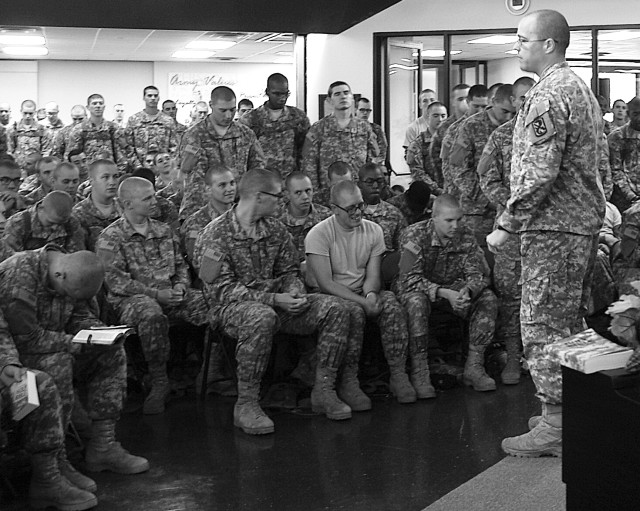Fort Benning, Ga. - Meeting the religious needs of Soldiers is a priority for Fort Benning chaplains, said Chaplain (COL) Glenn Davis, post senior chaplain.
"If you look at the mission of the chaplaincy, it is to accommodate the free exercise of religion - that's a constitutional right," Davis said.
That mission is especially vital on Sand Hill, where Soldiers spend several weeks in a controlled training environment, he said. They can't drive into town to visit a local church, so diverse religious needs must be addressed in the training area.
"For many of them, this is the hardest thing they have ever tackled in their lives. That one hour in the chapel on Sunday and being able to exercise their faith to find that source of endurance, strength, courage ... often that one hour is what helps them get through the other six days of the week," Davis said.
COL Daniel Kessler, commander of the 198th Infantry Brigade, started a semiannual luncheon last year to help address Soldiers' religious needs.
He meets with lay leaders and members of the brigade's command team to discuss what works and what needs improvement, he said
"We meet just to make sure we exchange information and make sure there's nothing our extended teammates need to provide the best support possible to our Soldiers," Kessler said. "We intend to make it a battle rhythm event."
Kessler said the meetings have helped him solve problems related to space and resources, learn more about other religions and develop partnerships with community religious leaders.
"Our responsibilities as chaplains is to have a plan of religious accommodation for as many faiths as we possibly can," said Chaplain (LTC) Tom Wild. "So we bring in some people from the outside to assist."
Religious leaders from Columbus who support Sand Hill include a retired NCO and imam, a Greek orthodox priest and a Latter Day Saints elder. Chaplains from Main Post, including a Lutheran or Episcopalian minister, and Sand Hill chaplains, including a Jewish rabbi and Catholic and protestant leaders, also hold services for the basic trainees. Various nondenominational Bible studies occur throughout the week.
Wild said they don't have the ability to have a service for every faith, but they accommodate other religions, such as Buddhism and Hinduism, by allowing time for meditation.
"We monitor the numbers," he said. "If there's a significant increase in Soldiers (in a certain faith group) then we try to do what we can to create a service for them. We just wanted to make sure religious freedom is being afforded to all the Soldiers. That is paramount."
Wild said Sand Hill chaplains keep their ears open to find out if a Soldier is being ridiculed for his religion or is unable to fulfill the tenants of his faith, whether related to dietary restrictions or holy day observances.
"This is an intense fourteen weeks for them," he said, "and there's little time in that schedule. The main mission is to get these Soldiers trained, because some of them are going to be going off to a war zone soon. But we do our best to take every window of time we have to bolster their faith or give them that opportunity to have their faith encouraged."
Kessler said the 192nd and 198th Infantry brigades are meeting Soldiers' religious needs, but they're always watching for ways to improve.
"Many of these Soldiers within a few months are going to be deployed to Iraq or Afghanistan," Davis said. "We have the goal in our training to produce Soldiers who are physically fit, mentally tough, who are professionally proficient, but we want them also to be spiritually strong as they prepare to serve in a combat environment. And in the end, that's what it's about."
The next religious lay leader meeting will be Nov. 24.


Social Sharing